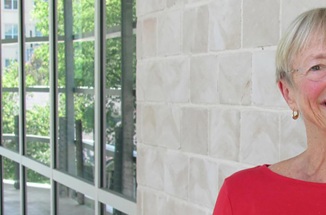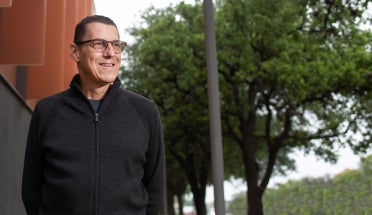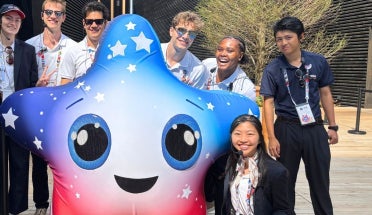
Legacy Spotlight: Ivy McQuiddy
- Sep 6, 2013
- Education Abroad
- Angie Pastorek
Growing up in southern Illinois, Dr. Ivy McQuiddy did not imagine that her life journey would lead her to a lifelong dedication to international education. She also did not know it would lead her to becoming the first Director of Education Abroad at The University of Texas at Austin.
Her commitment to expanding student access in international education has led to various contributions to the study abroad programs offered at this university. Today the university's Texas Global develops and manages a full range of international education programs, including Education Abroad, International Student and Scholar Services, English as a Second Language training, Special Projects and International Risk and Safety.
Her Journey
After living in Australia, McQuiddy and her husband later moved to Ankara, Turkey, where they lived for seven years. This is where she began teaching English as a Second Language at Middle East Technical University.
McQuiddy learned ESL instruction the hard way, trying different methods and seeing what worked best for each student. The experience of simultaneously teaching one language and learning another helped her understand the challenges her English Language Center students faced while learning English.
“By doing the work of language learning as both a teacher and as a student, I saw how language learning connects people and cultures,” McQuiddy said.
After being overseas, McQuiddy experienced “reverse culture shock” once back in the United States. She returned to a new community, and two new roles – one as a single parent to her two sons and the second as a doctoral student in the Center for Foreign Language Education at The University of Texas at Austin.
“I had to re-acclimate to U.S. culture, having lived abroad for so long,” McQuiddy explained. “I realized that my experience coming back to the U.S. was similar to what an international student coming to the U.S. experienced upon arriving here.”
McQuiddy attained her doctorate in Applied Linguistics with a focus on English as a Second Language, intercultural communication and sociolinguistics.
The Beginning of a Legacy
Because of her contributions to international education, McQuiddy was asked to lead the University’s first Education Abroad Office to expand the University’s study abroad programs. In 1986, only a handful of study abroad programs existed on campus and about 90 students studied abroad that year. McQuiddy accepted, and by January 1987, the Education Abroad Office was officially recognized by the University. Today about 2,400 students study abroad every year.
“I was motivated by the belief that every American student should have the experience of being a ‘stranger in a strange land,’” McQuiddy said. “I felt strongly this experience would help them empathize with international students on the UT campus and would lead to a better understanding of the world.”
Advocating Institutional Change
A major accomplishment for Education Abroad was a referendum created by and voted on and approved by the student body. This referendum established a one dollar fee to be part of every student’s registration each semester to fund study abroad scholarships. It took two years, but the Legislature approved the fee, and the International Education Fund Scholarship, or IEFS, continues to fund study abroad scholarships to this day.
Even with the IEFS money, studying abroad remained out of reach due to the financial investment required for travel and program costs. The lack of academic credit hours offered for participation was another barrier.
“About this time, I attended the annual conference of the National Association of International Educators. We learned that, contrary to the popular belief on campus, federal financial aid could indeed be used to pay for study abroad programs,” McQuiddy said. “This was a real breakthrough for expanding access to study abroad opportunities.”
A Breakthrough Opens Doors
A significant step forward was the request made to the Vice Provost for Student Affairs to establish a faculty committee to identify how and where to begin expanding study abroad programs.
“Once financial aid was available and we were able to begin offering academic credit for study abroad, the number of available programs grew quickly,” McQuiddy explained. “As a result, in less than a decade we went from having fewer than 100 students studying abroad each year to over 1,600—becoming number one in the nation for student participation in study abroad.”
For her efforts, McQuiddy received the Marita Houlihan Award from the Association of International Educators in 2001 for implementing the University’s IEFS scholarship and incorporating study abroad into under-represented disciplines.
Texas Global Continues to Expand Student Access
After McQuiddy retired in 2002, a group of her colleagues and former students wanted to honor her contributions and established the Ivy McQuiddy Endowment for Education Abroad, which still funds many study abroad scholarships.
“It was incredible to be recognized in that way, especially because the need for scholarship money has always been critical to helping UT students achieve their dream of studying abroad,” McQuiddy said.
A variety of program lengths are now available - from five-week, to semester and year-long programs – helping to make study abroad attractive and affordable. The ongoing commitment to expanding the number of credit-bearing study abroad programs also helps students integrate study abroad into their degree plans while completing their degrees on time.
“I fervently believe that study abroad should be an integral part of every UT student’s education,” McQuiddy said. “There’s nothing else I’d rather have devoted my professional life to, and I’m excited to see what the future holds for international education at UT.”



